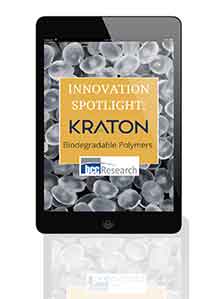Innovation Spotlight: Kraton: Biodegradable Polymers
It is hard to get the image of a landfill and/or ocean full of trash out of our minds. Although making up only a small portion of the municipal solid waste (MSW), conventional plastic products made out of petroleum do not mix well with nature. Some plastics take years to partially decompose, and even then they break down into smaller pieces which are almost impossible to clean, adding toxicity to our Earth and ultimately our food and bodies.
So, why do plastics still exist? They are convenient and cheap.
Most publications on bioplastics and biodegradable polymers focus on developing new polymers that are cost-effective, environmentally friendly, with mechanical properties that resemble conventional plastics.
The global market for biodegradable polymers is expected to grow because of the high demand in a broad range of end-user industries across the globe. Although biodegradable polymers have been commercially available for several years, they are still considered early in their product lifecycle. This market faces several major problems; most importantly relatively high prices and the lack of infrastructure for effective composting, a critical aspect for market success.
To shed more light on the bio-based chemical solution, BCC interviewed the Global Strategic Marketing Director at Kraton Polymers, Yuliya Streen. Kraton Polymers is a global producer of bio-based chemicals. Their success secret is their holistic approach to the product life cycle, a step toward enabling the circular economy.
Download Innovation Spotlight
